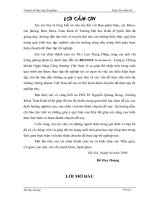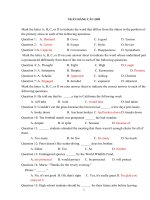2015 04 28 CIMA EMAT conf 25 april KPIs r tidd and outcome costing a macnab
Bạn đang xem bản rút gọn của tài liệu. Xem và tải ngay bản đầy đủ của tài liệu tại đây (2.09 MB, 64 trang )
CIMA Conference: Essential management
accounting tools
Key performance indicators
Robin Tidd, FCMA CGMA, MCIM
Saturday 25 April 2015
Robin Tidd MBA FCMA CGMA MCIM
•
Founder of rtm established 1980
•
Working time spent on performance improvement and culture exercises
with businesses of all sizes. Led over 250 assignments over the past 34
years.
•
Run 300 Managing Directors’ Workshops attended by 3000+ MDs
•
Chairman 2000-2005 of CIMA Members in Practice Group. Council
Member and member at some time of five different policy committees of
CIMA
•
Currently launching expansion of a unique new model retainer business
for SME’s.
•
Author of dozens of articles and of four publications including ‘Business
Performance Management’ ‘the Road to Continuous Improvement and
‘KPIs’ for Nelson Croom, award winning on-line publishers .
The three Purposes of Key Performance Indicators
• To show results across the business … the
Scorecard
• To provide knowledge of how to improve
• To motivate and involve… to cause action
The latter point is the most
difficult.
All three are essential
Managers getting Control of their Processes…..
The best you can ever do as a front line manager with a given
Process is:1. Define what good looks like as an outcome in simple
measures
2. Frequently (SICs) measure whether you are hitting that
level
3. If you are …move the target
4. If not why not, where is the leakage/waste/opportunity
5. Agree actions with your people
6. Log the actions
7. Review the actions frequently (SICs)
8. Ensure that actions are done
…and so get control of the process
Mapping or modelling a Process should make it clear what to
measure
Quote
“In some organisations only one person
has the overview, and is too busy to do
anything about it.”
Managing Director
Finance Director
Sales Director
Manager
Customer
Services
(inside)
‘Reps’
Manager
Special
Products
Manager
General
Products
Purchasing
Manager
Production
Manager
Technical
(QA)
Manager
Warehouse &
Distribution
Manager
Assistant
Accountant
No
Staff
Production
Supervisor
Staff
Estimator
Drivers
Production Coordinator
Stores
Controller
Foreman &
Workforce
Production
Office Staff
Design
Supervisor
Warehouse
Manager
Warehouse
Staff
Staff
Who do we work for?
• We need a hierarchy so that everybody has someone to
look to for development. We need it for management.
• BUT We should view the organisation as a series of
processes with feedback loops. There are internal
suppliers and customers and it all leads to the customer.
• Ultimately we work for the customer not the boss.
What do others say?
• Good to Great (Jim Collins)
– ‘Confront the brutal facts’
– ‘Be disciplined’
• Winning KPIs (David Parmenter)
– ‘Only 10% of (the Fortune 500) organisations know how to use KPIs
properly???’
– ‘A KPI which is not (reviewed) at the very least weekly is useless as a
performance tool’
• Out of the Crisis (W Edwards Deming)
– ‘Understand the process’
Culture is fundamental… and how you use information is
fundamental to culture
The Deming or Shewhart Cycle
Measurement
built in here
Essentially a
Circle..
LEARNING
ACT
PLAN
CHECK
OR
STUDY
DO
APPLYING
Monster Process Map….
(but it worked!)
Two stories about Short Interval Controls
• Monthly sales meetings
• Daily operations management filling
and testing gas bottles
…but it could be any kind of operation
Observations on Management Control
Reds Greens and Blues!
BEVERAGES
1
2
3
4
No. of people
5
6
7
8
9
Observations
1
2
3
4
5
6
7
8
9
10
11
12
13
14
15
16
17
18
19
20
16%
Absent
28%
Idle
56%
Working
Observations on Management Control
Reds Greens and Blues!
IND. 1
1
2
3
No. of people
4
5
6
7
Observations
1
2
3
4
5
6
7
8
9
10
11
12
13
14
15
16
17
18
19
20
30%
Absent
27%
Idle
43%
Working
Observations on Management Control
Reds Greens and Blues!
IND. 2
1
2
No. of people
3
4
5
6
Observations
1
2
3
4
5
6
7
8
9
10
11
12
13
14
15
16
17
18
19
20
39%
Absent
21%
Idle
40%
Working
Observations on Management Control
Reds Greens and Blues!
FILLING
1
No. of people
2
3
4
Observations
1
2
3
4
5
6
7
8
9
10
11
12
13
14
15
16
17
18
19
20
23%
Absent
34%
Idle
43%
Working
Supervision Time
Supervision Time
Short interval controls
• Look closer at the process and see more
• Aid the psychological ‘attitude to change’ process
• Enhance, reinforce and accelerate the learning process and therefore the
quality of the process improvements which actually happen
• Give time for re-adjustment when off plan, therefore creating prevention
(example sales visits and filling coleslaw)
• Short interval control principles relate both to
– provision of KPIs and to
– review meeting
A great culture has….
• Right figures, correct figures, remove fear
• Scientific, better decision making
• Honesty, openness and dealing in facts
• Efficiency in collecting information, reduced
investigations and reduced ‘ad hoc’-ery
• Direction and purpose… targets lined up with strategy
• Learning and improvement throughout the organisation
• Empowerment, involvement
Quote
“When the only tool you have is a hammer
its amazing how many things start to look
like a nail.”
The Process of Change
Levels of Acceptance
Acceptance of Change = Learning
PHYSICAL
LOGICAL
EMOTIONAL
‘Full on’ KPIs
What we mean by ‘Full-On KPI’s’ is:• every area of the business has its high level and low level KPIs being produced
automatically
• at the ideal intervals
• being reviewed with the people in the process
• against improvement targets
• regularly
• in a fixed hierarchy of well run Action Review Meetings
• being quantified in financial terms (££ per unit or per cent of out put, resource,
waste etc.)
• going into a high level dashboard
• which is also reviewed regularly
• allowing top management to see that managers are controlling their processes
THANK YOU
Robin Tidd
M 07973 713574
CIMA Conference: Essential management
accounting tools
Outcome costing & budgeting project
Dr Alasdair Macnab FCMA, CGMA
Saturday 25 April 2015
OUTCOME COSTING/COST
-EFFECTIVENESS and INTEGRATED
REPORTING in the PUBLIC SECTOR
Macnab Consulting Ltd









